
Municipal Resources
July 2021
Download This Article (.pdf)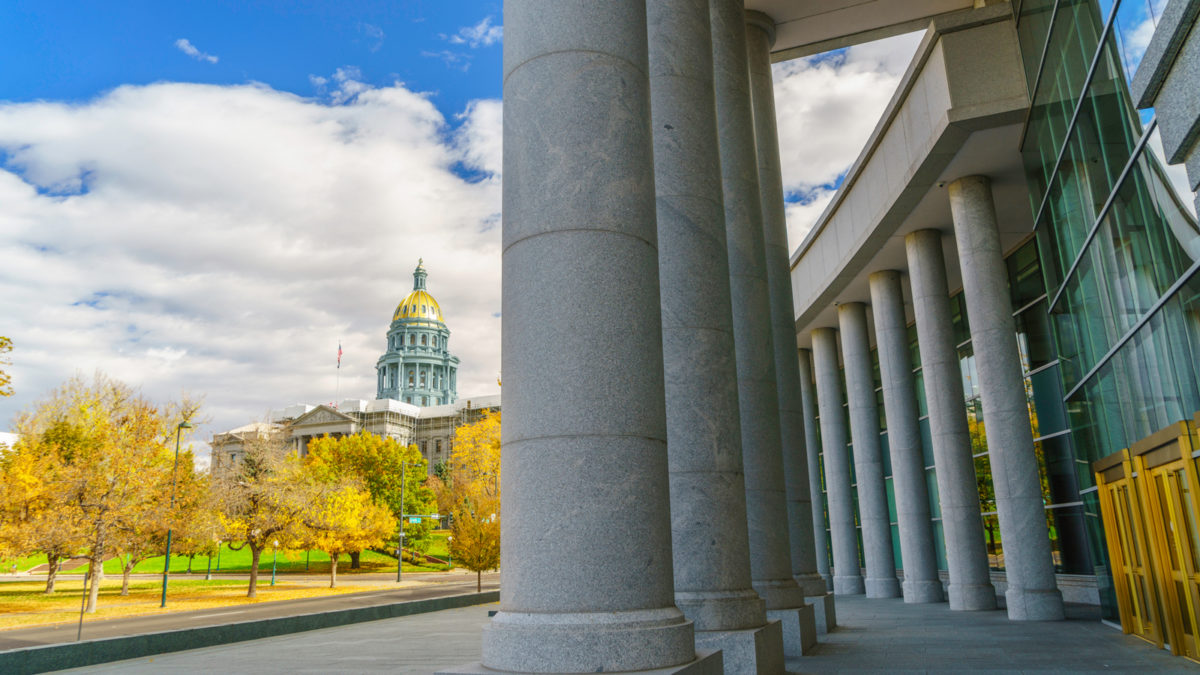
With all due respect to the legal education institutions where we matriculated and earned our juris doctors, most lawyers would agree that upon graduation we had learned to “think like lawyers” but not necessarily about the inner workings of the legal system. We learned a great deal about constructing arguments from case law and how to research annotations on state statutes. How many of us, though, have been caught unawares when trying to navigate the byzantine structure of local government? For many of our clients, municipal law is probably one of their biggest day-to-day concerns. Areas it impacts include:
- property—building codes, zoning, land use plans, and property records;
- taxes—sales and property;
- criminal—municipalities set their own ordinances, such as traffic laws;
- education—school districts are often arms of the local government; and
- trials—municipal courts exist to adjudicate violations of local ordinances.
This list is far from exhaustive. Municipal law touches on so many areas that it’s not possible to provide a crash course on it here. Instead, this article highlights some of the more useful resources for learning about your local jurisdiction’s codes and operations.
Sources of Authority
Article XIV of the Colorado Constitution governs counties, and Article XX of the Colorado Constitution governs home rule cities and towns. For example, Colo. Const. art. XX provides that the City and County of Denver operates as a combined county-city government with a municipal structure. More specific restrictions and grants of authority are codified in Titles 29 through 32 of the Colorado Revised Statutes.
A list of current local governments, organized alphabetically and by type, is available from the Colorado Department of Local Affairs.1 You can also use this resource to discover how many of each government type exists in-state, as well as the specific constitutional and statutory authority for each type.
If you’re unsure about the boundaries of a particular special district, the State Demography Office puts out a map of all the special districts in the state,2 though you’ll need to use its drop-down menu to select the type of district you’re searching for.
Municipal Ordinances
Municode3 has one of the largest online repositories of municipal codes. Below is a screen shot of the Denver Revised Municipal Code in Municode.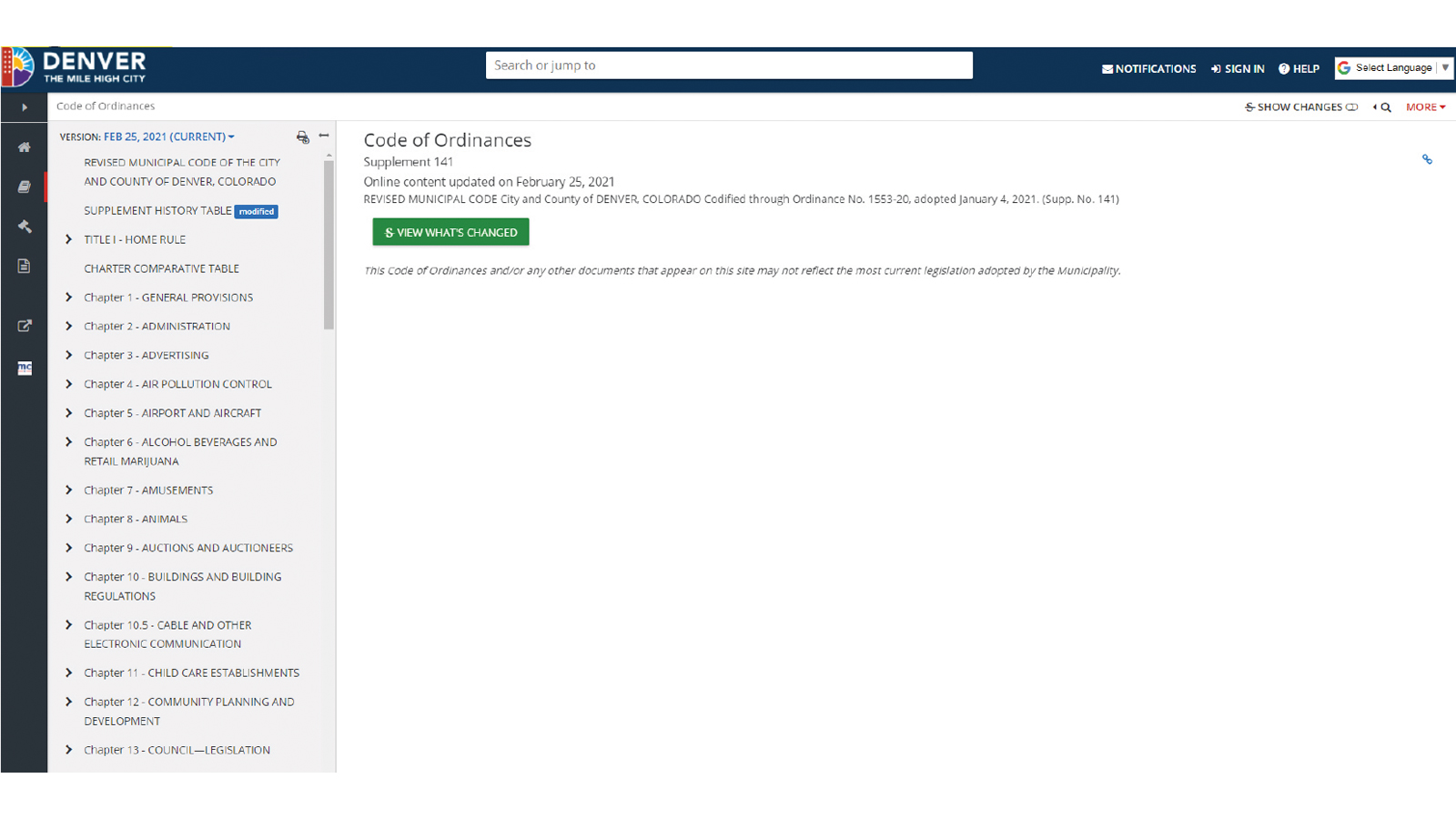
Municode defaults to keyword searching, but advanced operator and Boolean searches are also available search options. The syntax for these searches differs from what you might be used to in Westlaw or Lexis, but Municode provides an FAQ that lists its proper syntax.4 To find this FAQ, click on Help in the top-right corner, and then select Advanced Search Options from the Help page.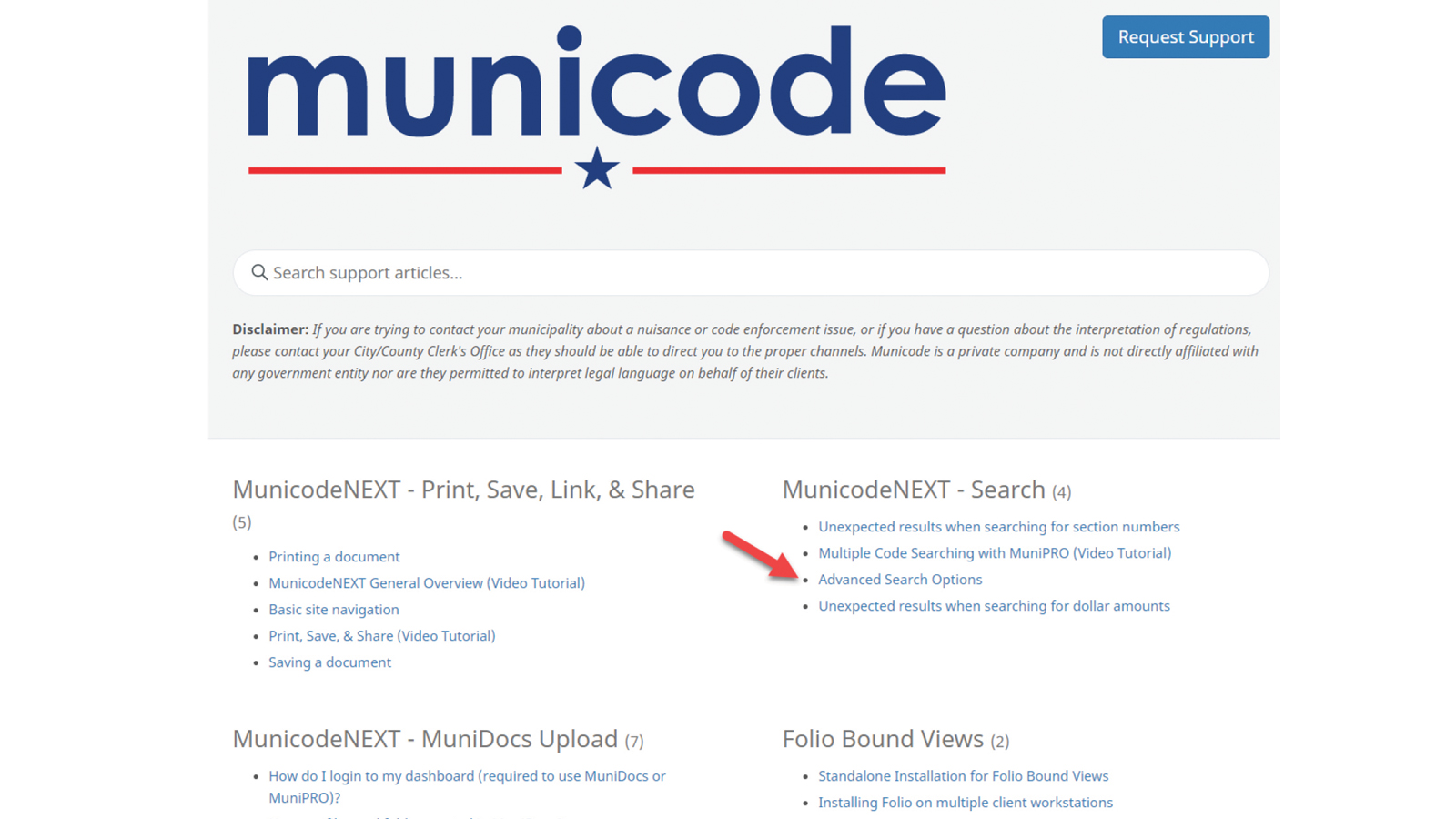
Other online sources for municipal codes include:
- Code Publishing Co.5—Frederick, Glendale, Granby, Grand Junction, Gunnison, Ouray, Parachute, and Telluride; and
- American Legal Publishing Co.’s Code Library6—Akron, Breckenridge, Colorado Springs, Creede, La Jara, Littleton, Morrison, Simla, Vail, Winter Park, and Yuma.
While these websites do not host as many jurisdictions as Municode, their search pages and filters are more advanced and intuitive than the coding syntax from Municode’s FAQ.
You can set up notifications to receive alerts when new ordinances are enacted or codes are updated for your local jurisdiction. Municode also includes archived code versions that go back to 2012 for most jurisdictions. To look at older code versions, click on the Version drop-down on the left side of your screen.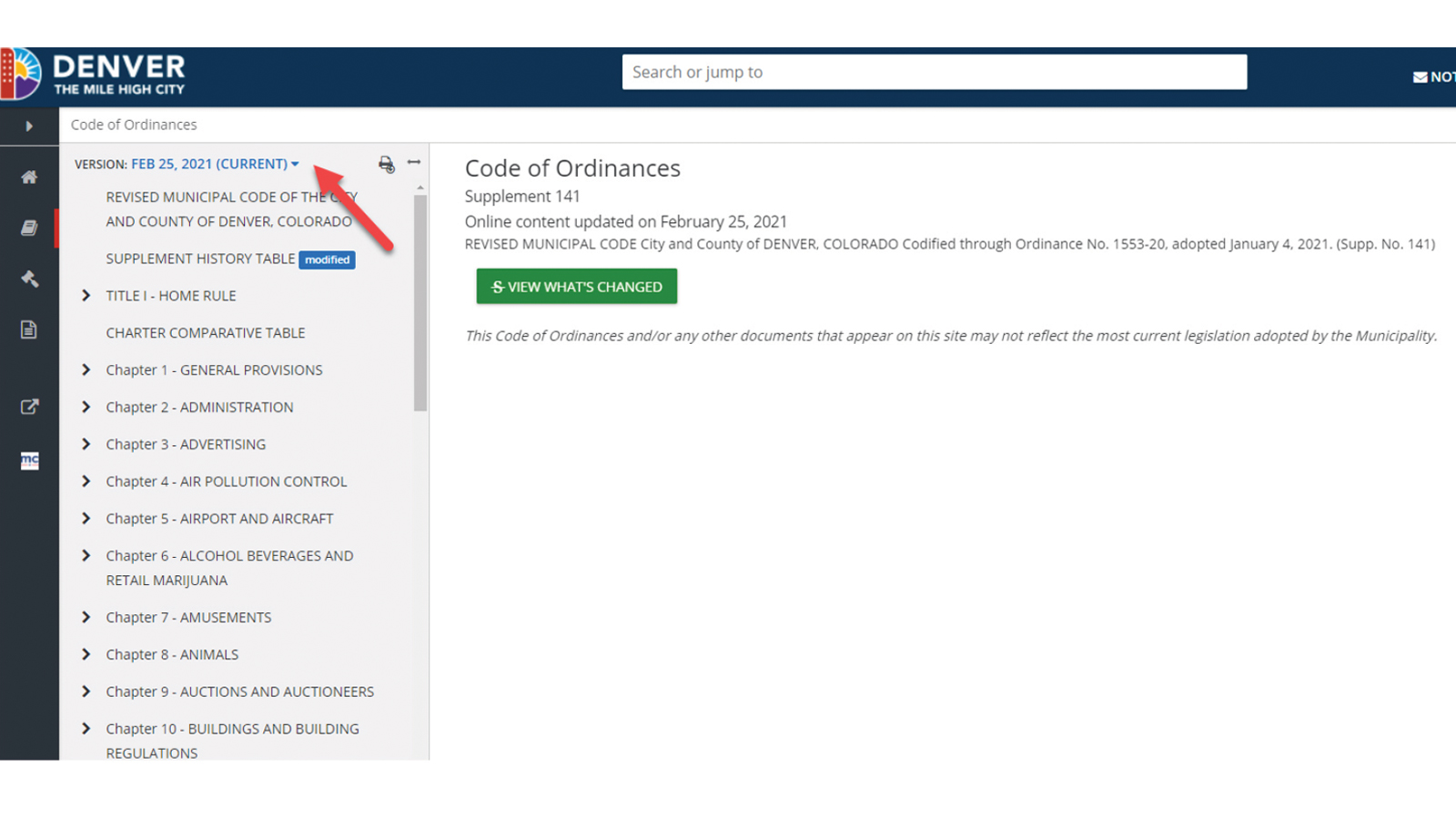
This will give you a list of every archived version of the code. You may need to scroll down to find the version you need.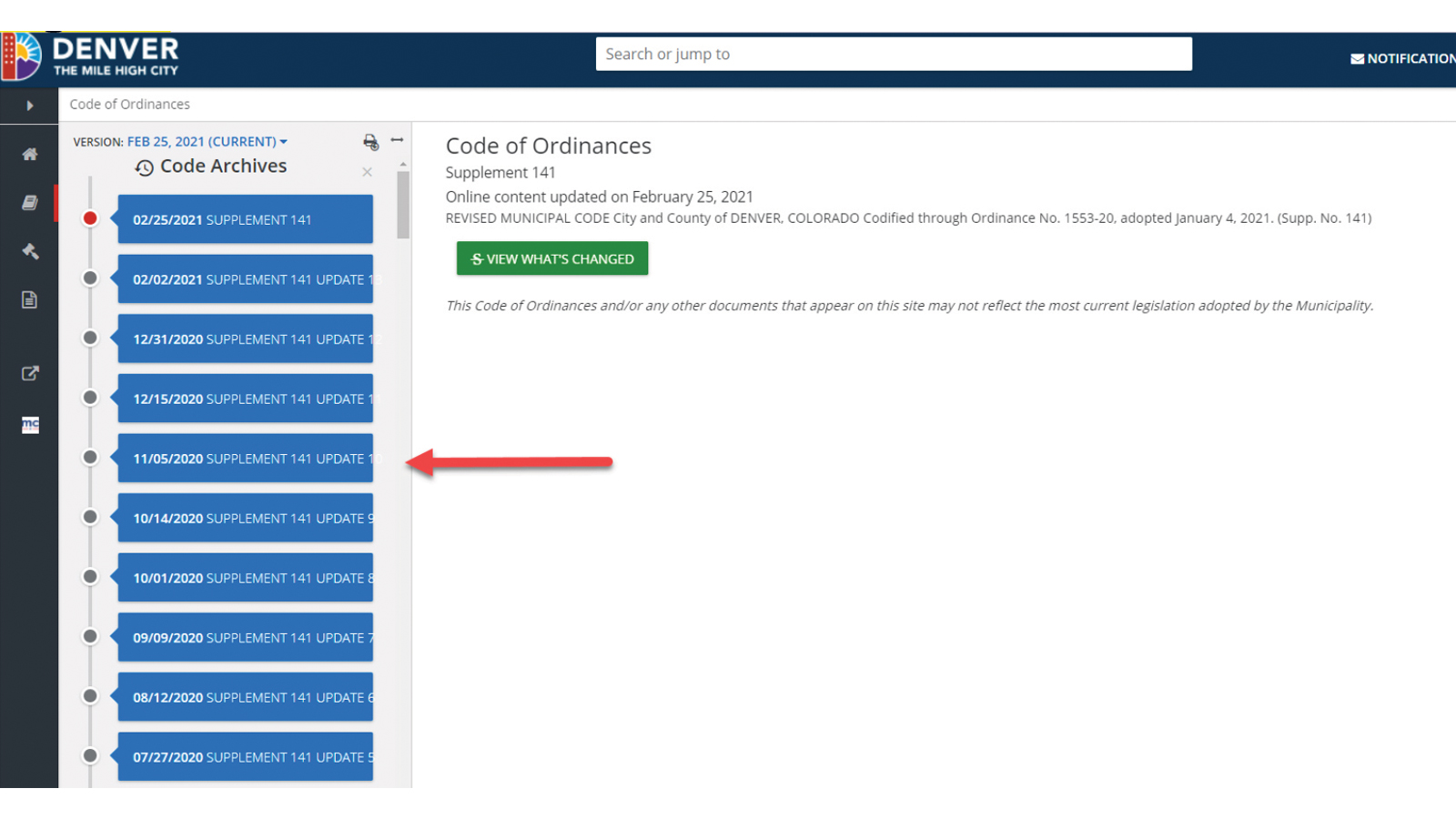
Let’s say you want to track the history of changes to Denver’s “camping ban,” CRS § 38-86.2. First you would pull up the section itself and look at its historical notes.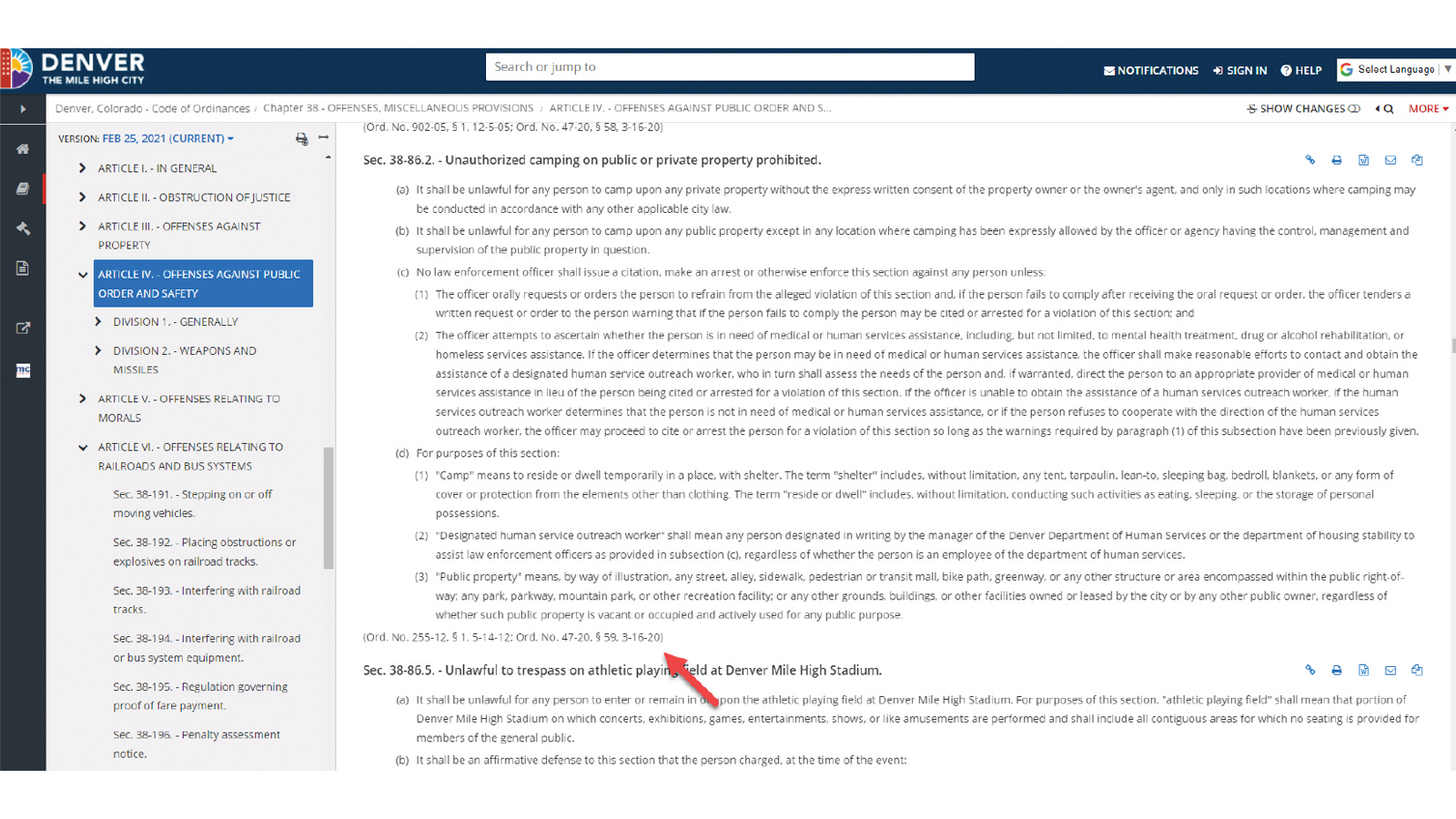
Here you see that the section was added by Ordinance Number 255-12 on May 14, 2012, and it was amended by Ordinance Number 47-20 on March 16, 2020. You could use the Version drop-down to go back and look for a version prior to March 16, 2020 and compare the two versions, or use Municode’s Show Changes function.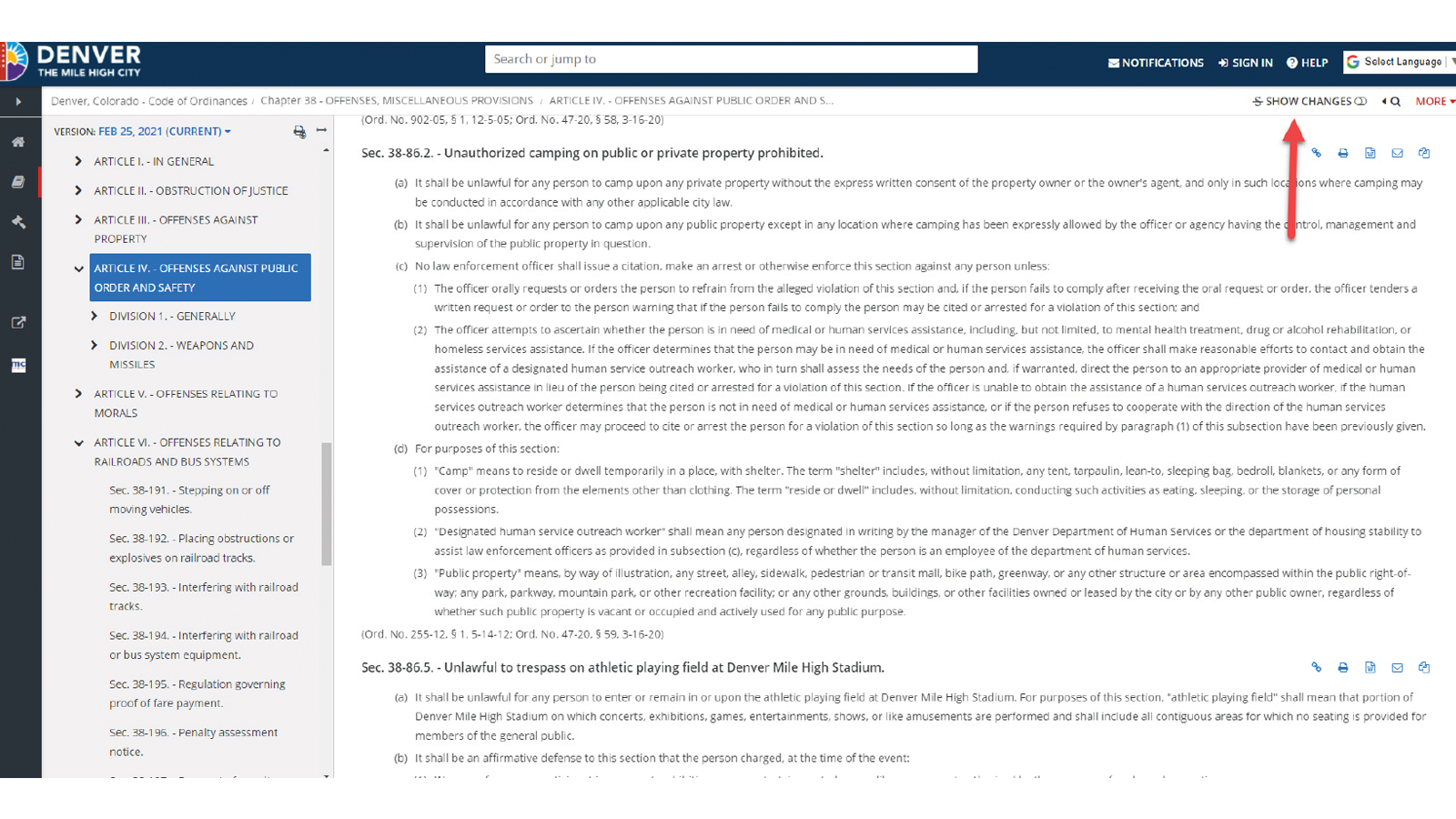
Clicking this will open a side panel showing all changes from the previous version to the current version.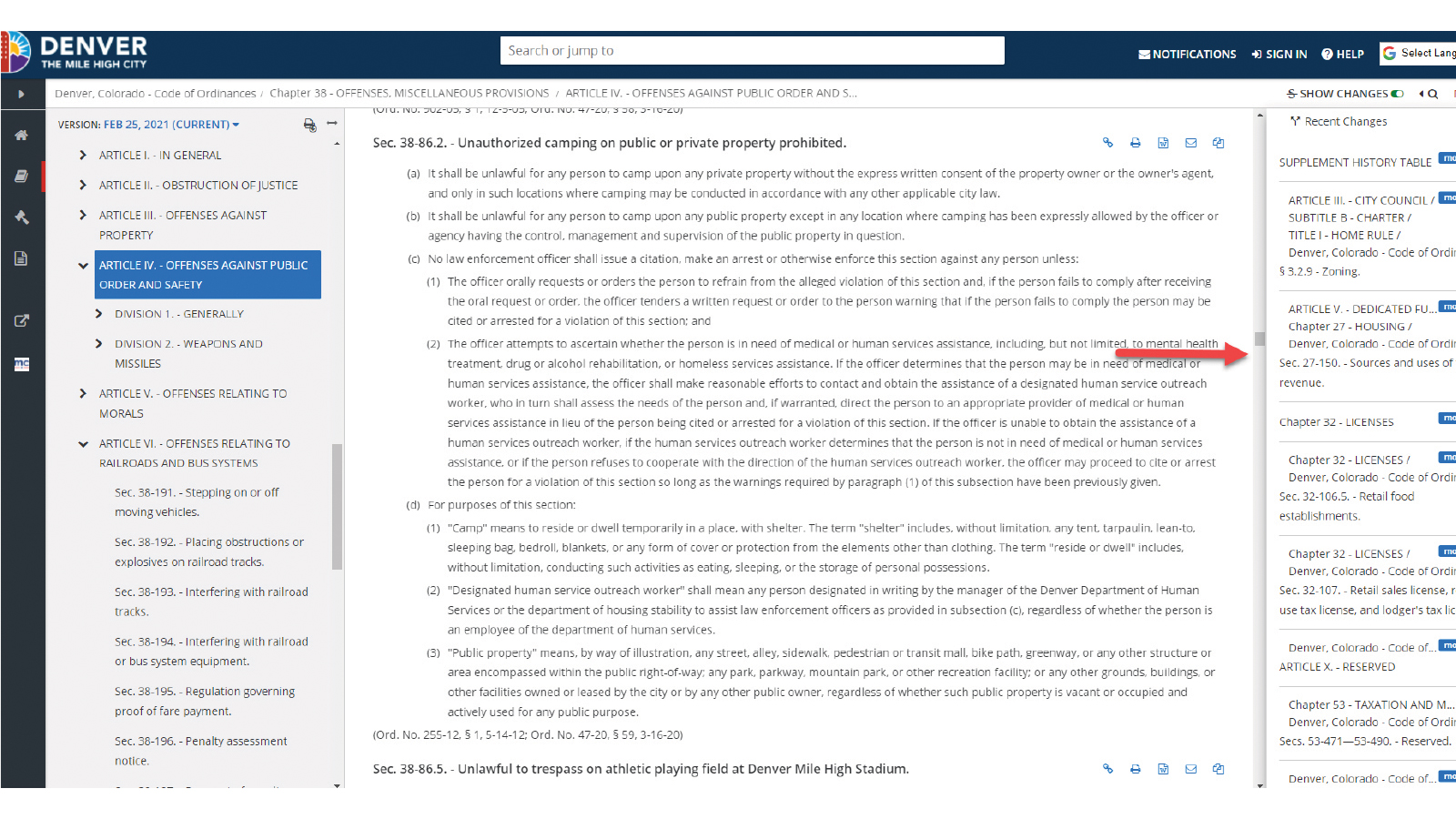
You’ll then need to find the version after the change. Denver’s codes have a version from March 20, 2020, but the changes had not yet been added to the archive. You’ll need to keep going forward. The April 20, 2020 supplement, the next archived supplement, shows the codified changes of March 16, 2020. The Show Changes bar displays the sections that have changes. When you click on the section you want to see, Municode will direct you to that section and highlight the changes.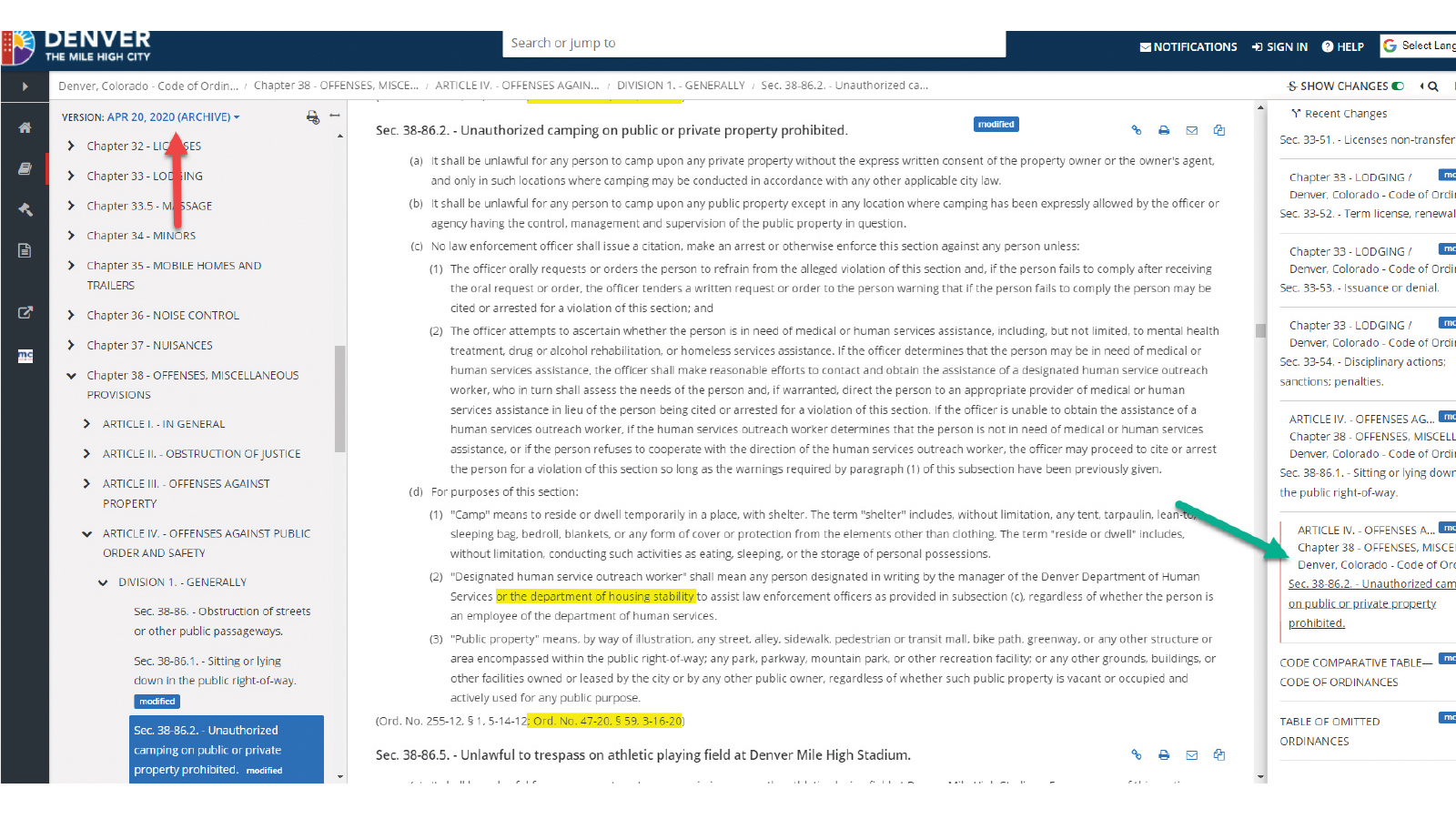
Legislative History and Historical Ordinance Research
Legislative history and historical ordinance research isn’t just for state and federal statutes, but you may have to do some extra legwork when researching municipal ordinances. In addition to the online Municode archives, several libraries have extensive physical collections.
The Denver Public Library’s main branch has a special collection for Genealogy, African American, and Western History Resources7 that includes physical copies of City Clerk and Recorder records as far back as 1858 and City Council minutes as far back as 1868. Currently, access is limited due to COVID-19, but the reference desk can be reached at (720) 865-1821.
The William A. Wise Law Library at the University of Colorado-Boulder holds municipal codes for another 31 municipalities.8
You can also check with the local City or County Clerk and Recorder’s office for your desired jurisdiction. These offices can let you know how far back their archives stretch and whether they have partnered with a local library to store older materials.
To research the legislative history of a particular ordinance beyond just its historical changes, you’ll need to first look at the source notes for a particular section and write down the ordinance numbers and dates of each change. Using those dates, you can then look for the minutes associated with meetings on those dates. You may want to look at minutes for preceding meetings to see if the measure was discussed before the final vote. These records should be held by your County or City Clerk and Recorder, or by a local library that archives such materials.
Tracking New State Legislation and Municipal Ordinances
The Colorado Municipal League (CML) compiles a list of enacted state laws that affect municipal governments, sorted by year.9 The CML also publishes a primer on its legislative advocacy priorities for the current session10 and its analysis and position on proposed legislation.11 If you find yourself advising a local government entity as a client, or a client that does business with local government, CML is a great way to stay informed of any state code changes that could impact your clients.
If you’re looking to stay abreast of changes to local jurisdiction codes, you’ll need to monitor the city’s or county’s website for upcoming meetings, which should also give you access to minutes from previous meetings. For instance, the City of Golden website has a Government tab12 where you can select agendas, meeting minutes, legal notices, and schedules.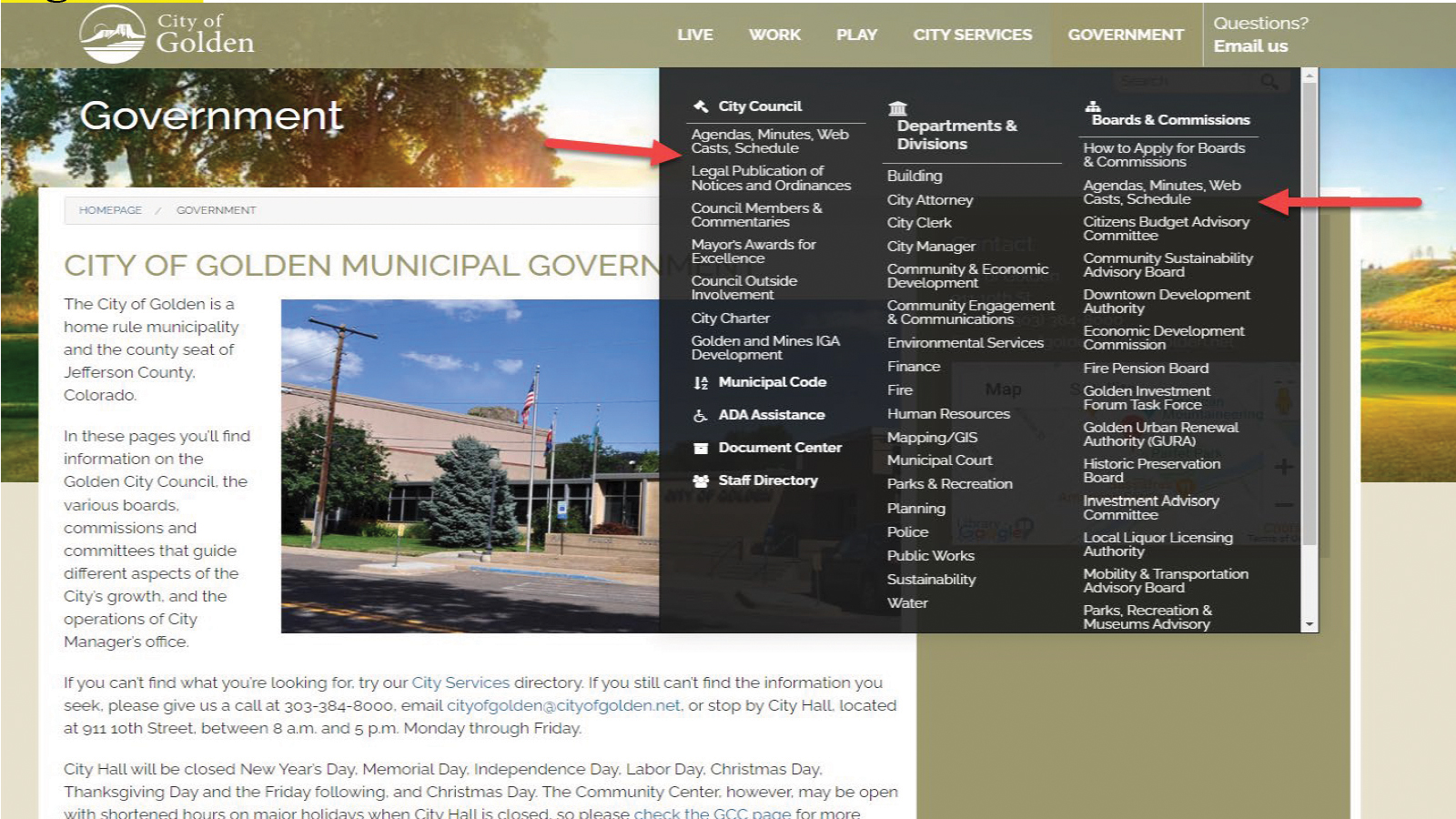 Some jurisdictions allow you to sign up for their newsletter, which should include notices of upcoming meetings and proposed ordinances as well.
Some jurisdictions allow you to sign up for their newsletter, which should include notices of upcoming meetings and proposed ordinances as well.
Secondary Sources
Westlaw has an entry for Municipal Law under Practice Areas. From here, you can access Secondary Sources to find such resources as American Law Reports—Municipal Law; Local Government Law; McQuillin’s Municipal Law Report; Municipal Legal Forms; model municipal ordinances; and West’s guide to State and Local Government Civil Rights Liability. You can also search the Colorado Lawyer archives on Westlaw for articles related to municipal or local government law.
If you have a Lexis subscription, instead of Municipal Law, you’ll want to select Governments under Practice Areas. Here, you will find Antieau on Local Government Law, Second Edition; the City Manager’s Desk Reference; Insurance and Risk Management for State and Local Governments; several entries on public procurement; and several municipal/local law handbooks for other states.
The Westminster Law Library at the University of Denver and the William A. Wise Law Library at the University of Colorado-Boulder have a print copy of The Law of Municipal Corporations by Eugene McQuillin, the preeminent treatise on local government law. They also have back issues of Colorado Lawyer. The Colorado Supreme Court Library also responds to reference requests.13
State Programs and Factual Research
If you need to go beyond codes, deeds, and licenses to support your arguments, there are several resources that have collected and made available various forms of statistical information.
The Department of Local Affairs (DOLA) is the home of the Division of Local Government.14 In addition to serving as a point of contact for local leaders to work with the state government, it provides a host of information on its website, including demographic data, land use surveys, model codes, budgets, sample sustainability plans, training resources, and most recently the 2020 Prison Use Study commissioned by the General Assembly.
MuniNet Guide15 is an online publication provided by MuniNet LLC, a private organization, that provides the following information for free for a range of jurisdictions:
- employment data16
- demographics17
- education, healthcare, housing, public safety, transportation, and utilities data.18
Conclusion
When researching local government issues, it’s best to just dive in and explore the resources described above, bookmarking those that seem to have bearing on your practice area so that the next time a question arises, you’ll already know where to look. If you’re still in doubt, contact a reference librarian at the William A. Wise Law Library (lawref@colorado.edu) or the Westminster Law Library (help@law-du.libanswers.com), and we’ll be happy to suggest new search strategies and resources.
Related Topics
Notes
1. https://dola.colorado.gov/lgis.
2. https://demography.dola.colorado.gov/CO_SpecialDistrict.
3. https://library.municode.com/co.
4. https://librarysupport.municode.com/articles/32271-advanced-search-options..
5. https://www.codebook.com/listing/#CO.
6. https://codelibrary.amlegal.com/regions/co.
7. https://history.denverlibrary.org.
8. https://lawcollections.colorado.edu/colorado-municipal-codes.
9. https://www.cml.org/home/advocacy-legal/Colorado-Laws-Enacted.
10. https://www.cml.org/home/advocacy-legal.
11. https://www.cml.org/home/advocacy-legal/statehouse-report/cml-bill-list.
12. https://www.cityofgolden.net/government.
13. https://cscl.colibraries.org/colorado-judicial-branch.
14. https://cdola.colorado.gov/local-government.
15. https://muninetguide.com.
16. https://muninetguide.com/job-market/employment-data.
17. https://muninetguide.com/demographic/colorado.
18. https://muninetguide.com/infrastructure.


